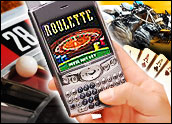
Handheld computers have simplified many activities. Individuals can surf the Web, text message their friends, buy a new pair of pants, and, increasingly, try to hit the jackpot in the lottery.
Market research firm Juniper Research expects the worldwide mobile gambling market to grow from US$1.35 billion in 2006 to $16.6 billion by 2011 — and the increase is coming outside of the U.S., which currently prohibits the activity.
“The mobile channel will push gambling services out to a broader, lower stake market than existing channels, offering significant opportunities for market growth,” Bruce Gibson, research director at Juniper, told TechNewsWorld.
Convenient Casinos
Mobile gambling is rising because of the ubiquity of handheld devices as well as the convenience these devices offer. In 2006, the number of handheld devices sold worldwide passed the 1 billion mark, indicating a gigantic pool of potential users.
Mobile gambling functions rely largely on text messaging, which has become simple to use and quite popular. These features gel with the impulsive nature of playing games of chance and allow gamblers to go online and wager when they are sitting in a restaurant, waiting for a bus or even working at their desks.
These gamblers find a growing number of gambling outlets. Sports betting is currently the largest sector in mobile gambling, and fans now wager on a variety of professional leagues, with soccer being the most popular. Lotteries are the second most popular segment, but Juniper Research forecasts it will take the top spot by 2010 as related games, such as bingo, become more widely available. Casinos offer virtual games like poker, blackjack, roulette and craps, and they have also achieved wide popularity.
Europe, Asia Lead the Way
Gambling services attract a variety of customers, according to Gibson. “The typical mobile gambler will be [a] young, upwardly mobile professional with disposable income,” he said. While most gambling has been male oriented, the availability of games like bingo and skill games will attract more women and make it popular to both genders.
Mobile gambling enterprises started to evolve at the turn of the millennium and have become well established in certain areas. Europe has been a hotbed for mobile gambling, with Juniper Research estimating that users placed $665 million in bets there in 2006.
In the Netherlands, Sweden, Germany, Britain and Austria, mobile phones are regularly used to buy lottery tickets, bet on sporting events or enter sweepstakes for prizes. These services are also rapidly gaining ground in Asia. In fact, Juniper Research expects Asia to become the market’s largest segment, accounting for $6.7 billion by 2011.
Vendors have had to address various technical issues in order to spur market acceptance. Security is at the top of the list. After people dial in and enter their wagers, wireless e-mails are sent back asking them to confirm all the details.
Typically, winnings or losses are logged into an account the bettor has set up, and more authentication is required in order to make changes to the account. Content monitoring and filtering technologies enable cellular operators to monitor gambling traffic as it passes over their networks, and additional checks are in place in case of suspicious activity, such as unusually high numbers of bets.
Age Verification
Sequestering these services has been another concern. “Regulators want to make sure that young children do not take part in these services and then become gambling addicts,” Neil Strother, an industry analyst with market research firm The NPD Group, told TechNewsWorld.
Technological advances and new processes have been put in place to address this issue. Around the world, mobile network operators have imposed age verification procedures to ensure that users are old enough.
“Sometimes age verification is implemented by operators as part of a voluntary code of practice covering mobile content, such as in the UK,” Juniper’s Gibson noted. Many operators issue users PIN numbers to access special accounts, which are based on credit cards.
Because it is electronic and instantaneous, mobile gambling presents new logistical challenges, such as making sure that odds are fair. Betting equipment now includes software that determines dynamic odds, or odds that change as the betting process progresses.
Illegal Since 1934
Currently, the biggest inhibitor in the mobile gambling market has been a reluctance to offer these services in the U.S. In the summer of 2006, federal legislators put in place restrictions to keep mobile gambling illegal. U.S. regulators have been disinclined to embrace online gambling and are now thwarting mobile gambling as well.
The main problem is how the wagers are made — a 1934 law makes betting over a phone line illegal, and that law has halted gambling expansion in the online world.
This restriction has also made it more difficult for gambling companies to get paid. As part of its purchase of online bill payment service, for example, PayPal discontinued its online gaming business due to the uncertain legal status around online gaming. Financial service companies such as Citibank followed suit and no longer processes credit card payments from offshore gambling operations. Gibson sees this as a short-term rather than long-term problem and projects that North America will account for 6 percent of the mobile gambling market in 2011.
As the mobile gambling market takes shape, the question arises — how will it impact the current state of gambling?
“Initially, mobile gambling will be an additional channel for existing gamblers,” concluded Gibson. “In the longer term, the market will attract a significant number of new users as the inherent advantages of the mobile channel become apparent and as mobile gambling develops into a mass-market application.”











































